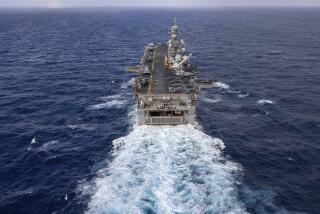A U.N. Force for the Gulf Would Let Soviets Muscle In
- Share via
The Soviets have launched a post-summit initiative in the Persian Gulf that is testing America’s ability to cope with the Kremlin’s diplomatic dynamism.
On the surface, Moscow seems to be falling into line with U.S. policy. For several months, Washington has taken the lead in trying to press Iran to accept a cease-fire in the long-running war with Iraq and then proceed to the bargaining table. The instrument of U.S. policy is the U.N. Security Council, and the method is to gain passage of a resolution imposing an international embargo on arms to Iran.
After raising one objection after another, the Soviet Union has suddenly reversed course and pronounced its support for an embargo resolution. There is, however, a catch: Western states must pass laws to prevent any arms sales such as conducted during the Iran-Contra affair, and there must be a United Nations naval force to blockade Iranian ports.
The first condition can be dismissed as propaganda. It is a Soviet reminder to gulf Arab states of past American perfidy toward them. Yet the second is more ambiguous. On plain reading, it looks as though the Soviets have ended their game of playing both sides against the middle: being for Iraq one day and Iran the next. By this reading, Moscow is going Washington one better by proposing not just an arms embargo, but one with teeth--the blockade--to make it work.
Matters involving apparent acts of Soviet accommodation are rarely that simple, however, and this time is unlikely to be an exception. This point requires some background on the general idea of a U.N. naval force. It did not, for example, originate in Moscow, but was made in America.
On the surface, the idea seems plausible. Many American critics of current U.S. policy--whereby the Stars and Stripes flies on Kuwaiti tankers that are thus protected by an American armada--have been looking for a face-saving way out. Creating a United Nations naval force could do the trick. Not only would it take the U.S. Navy out of harm’s way, but it would be a useful endorsement of U.N. peacekeeping and a complement to the regional diplomacy of Secretary-General Javier Perez de Cuellar.
A second look begins to raise doubts. Whose ships would take part? Who would command the force? By the precedent of other U.N. peacekeeping operations, neither superpower could be involved, and thus the Soviets wouldn’t sail into the Persian Gulf under a U.N. flag. But the Americans would have to sail out, and the locus for decision-making about key security issues would shift from Washington to U.N. headquarters in New York--where the Soviet Union has at least as much influence as does the United States. In short order Moscow would be dealt into the game of providing security for the Persian Gulf.
Equally fraught with political peril would be agreeing on the mission for a U.N. naval force. If it were committed to protecting all shipping in the Persian Gulf, that would represent a tilt toward Iran. Its oil passes through these troubled waters while Iraq’s does not. Thus Baghdad’s supporters would oppose creation of any U.N. force that was not directed solely against Iran, and the idea would stand no chance of being adopted.
By contrast, the force could be directed just at Iran--as with the blockade proposed by Moscow. Yet it is not clear how many nations would volunteer their warships as potential targets for the Ayatollah Ruhollah Khomeini’s Silkworm missiles, without the U.S. Navy standing by. Nor is it clear that gulf Arab states are willing to push Iran to the point of retaliating against them. Even if the idea could be agreed to and a force assembled, the signal to the gulf Arab states would be unmistakable: The United States is no longer capable of providing for regional security, but must rely on Soviet help. American influence in the gulf would rapidly crumble.
It is doubtful that the Soviets expect their idea to be accepted--especially since the Reagan Administration has expressed its misgivings. But by proposing it, Moscow embarrasses the Administration, curries favor with the gulf Arab states, appeals to U.S. opinion that is wary of America’s exposed position, and appears to be championing the United Nations. Furthermore, if by some fluke the Soviet Union’s proposal for a blockade were adopted, it would become virtually the only state physically able, overland, to satisfy Iran’s needs. Moscow would likely do so, clandestinely, but for a price. It would certainly gain incomparable leverage in Tehran.
The U.S. dilemma in the Persian Gulf thus continues. It has a strategic interest in limiting Soviet influence in Iran. But it depends on Khomeini not to attack U.S. warships, thereby provoking American retaliation that would drive Iran in the Soviets’ direction. There is no simple way to resolve this dilemma, which was caused by the short-sighted U.S. decision to reflag and protect the Kuwaiti tankers. Clearly, however, turning the mess over to a U.N. naval force would only mean abdicating responsibility for securing Western interests.
More to Read
Sign up for Essential California
The most important California stories and recommendations in your inbox every morning.
You may occasionally receive promotional content from the Los Angeles Times.










